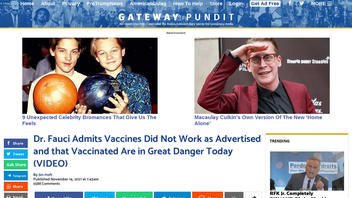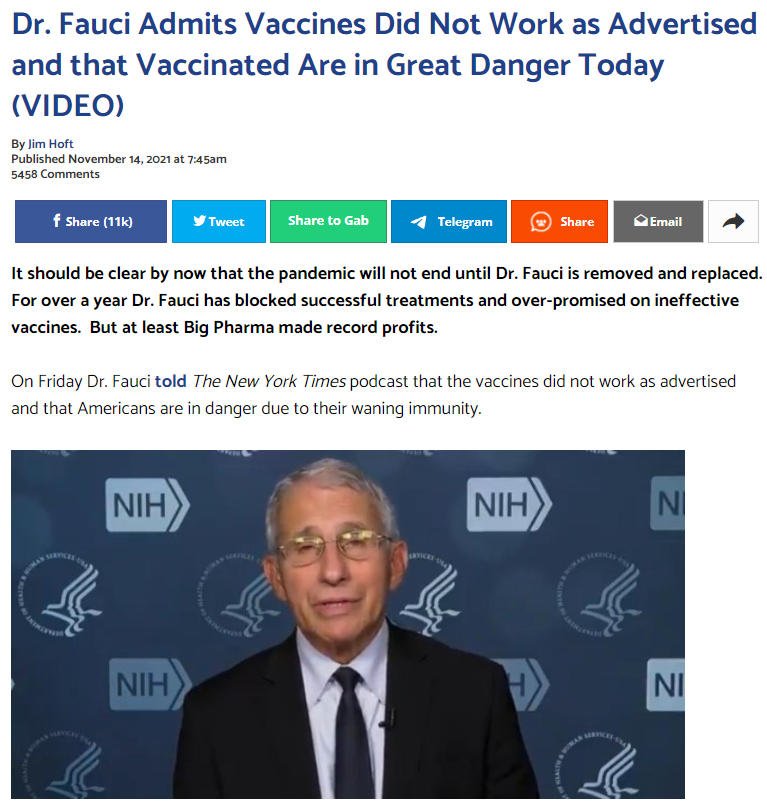
Did Dr. Anthony Fauci admit that COVID vaccines did not work as advertised and that the vaccinated are in great danger? No, that's not true. The director of the U.S. National Institute of Allergy and Infectious Diseases and the Biden administration's chief medical adviser strongly and consistently endorses the vaccination effort and has never suggested the vaccinated are at risk. He has endorsed "getting people more vaccinated."
The claim appears in an article published by the Gateway Pundit website (archived here) on November 14, 2021, titled "Dr. Fauci Admits Vaccines Did Not Work as Advertised and that Vaccinated Are in Great Danger Today." It opened (bold type as it appeared in the Gateway Pundit):
It should be clear by now that the pandemic will not end until Dr. Fauci is removed and replaced. For over a year Dr. Fauci has blocked successful treatments and over-promised on ineffective vaccines. But at least Big Pharma made record profits.
On Friday Dr. Fauci told The New York Times podcast that the vaccines did not work as advertised and that Americans are in danger due to their waning immunity.
As a solution to this problem Dr. Fauci is of course promoting more shots. When will this end?
This is what the article looked like on the Gateway Pundit website on November 15, 2021:
(Source: Gateway Pundit website screenshot taken on Mon Nov 15 16:06:50 UTC 2021)
Fauci made a November 12, 2021, appearance on The New York Times' podcast The Daily. It is true that the White House COVID adviser said officials are now starting to see some waning immunity against both infection and hospitalization with the vaccines. The prognosis is based on data coming out of Israel. At 6:25 in the podcast, Fauci says:
They are seeing a waning of immunity not only against infection but against hospitalizations and, to some extent, death, which is starting to now involve all age groups. It isn't just the elderly. So, if one looks back at this, one can say, 'Do you know?' It isn't as if a booster is a bonus, but a booster might actually be an essential part of the primary regimen that people should have.
Fauci says it appears the COVID vaccines are no different than other vaccines that need boosters, like the ones for hepatitis B and many childhood vaccines. While the infectious disease expert says he knows some are skeptical of boosters, he says at 10:05 in the podcast that they should wait for more data to come in on vaccine immunity:
It's waning to the point where you're seeing more and more people getting breakthrough infections, and more and more of those people who are getting breakthrough infections are winding up in the hospital. So, I think it would be a misrepresentation ... to say that the vaccines don't work. I don't think we've [been] given ... the full reign to prove what it is that you need to make them work. ... It's my scientific opinion and projection that boosters will be an essential part of the protection.
Nowhere during the podcast does Fauci say the vaccines did not work as advertised or that those who were vaccinated are in great danger. In the United States, 195.3 million people were fully vaccinated as of November 15, 2021, the Centers for Disease Control and Prevention says. Another 30.1 million have received a booster dose. About 60 million eligible Americans were unvaccinated.
In December 2020, when the first COVID vaccine was approved for emergency use, the more virulent delta variant was not the dominant strain, but the Food And Drug Administration still hedged on vaccine longevity, saying the following:
The vaccine was 95% effective in preventing COVID-19 disease among these clinical trial participants with eight COVID-19 cases in the vaccine group and 162 in the placebo group ... At this time, data are not available to make a determination about how long the vaccine will provide protection, nor is there evidence that the vaccine prevents transmission of SARS-CoV-2 from person to person.
On the contrary, the CDC says COVID vaccines are safe and recommended for people age 5 and above:
- Millions of people in the United States have received COVID-19 vaccines since they were authorized for emergency use by FDA.
- COVID-19 vaccines have undergone and will continue to undergo the most intensive safety monitoring in U.S. history. Learn more about how federal partners are continuing to closely monitor vaccine safety.
- A growing body of evidence has shown that these vaccines are safe and effective.
- COVID-19 vaccines were developed using scientific methods that have been around for decades.
- Before recommending COVID-19 vaccination for children, scientists conducted clinical trials. The FDA gave the Pfizer BioNTech COVID-19 vaccine emergency authorization to use in children ages 5 years through 15 years and full approval to use in people ages 16 years and older. Learn more about the process of developing, authorizing and approving COVID-19 vaccines.
- Some people have no side effects from COVID-19 vaccines. Many people have reported side effects that may affect their ability to do daily activities, but they should go away within a few days.
- There is no evidence that COVID-19 vaccines cause fertility problems.
- The benefits of COVID-19 vaccination outweigh the known and potential risks. Reports of adverse events, like allergic reactions or myocarditis or pericarditis, are rare.
- Everyone who receives a COVID-19 vaccine can participate in safety monitoring by enrolling themselves and their children ages 5 years and older in v-safe and completing health check-ins after COVID-19 vaccination.
Children 5 to 17 years old can receive the Pfizer vaccine, as well as adults. The Moderna and Johnson & Johnson shots are approved for those 18 and older. Details on the vaccines can be found here.
The CDC recommends booster shots for some vaccine recipients:
- People who received a primary mRNA COVID-19 vaccine series and are 65 years and older, 50-64 years with underlying medical conditions, or 18 years and older who live in long-term care settings should receive a booster shot at least 6 months after completing the primary series (which may include an additional primary dose in persons with moderate to severe immunocompromise).
- People who received a primary mRNA COVID-19 vaccine series and are 18-49 years old with underlying medical conditions, or 18 years and older who work or live in high-risk settings may receive a booster shot at least 6 months after completing the primary series (which may include an additional primary dose in persons with moderate to severe immunocompromise).
- People who received the Johnson & Johnson/Janssen COVID-19 vaccine and are 18 years and older should receive a booster shot at least 2 months after receiving their primary vaccine dose.
While the COVID vaccines and boosters are now the main thrust of the CDC's pandemic campaign, they are not its end-all. Virus protection includes a long list of recommendations on its How to Protect Yourself & Others web page. The tips include:
- Wear a mask
- Stay 6 feet away from others
- Avoid crowds and poorly ventilated spaces
- Wash your hands often
- Cover coughs and sneezes
- Clean and disinfect
- Monitor your health daily


















